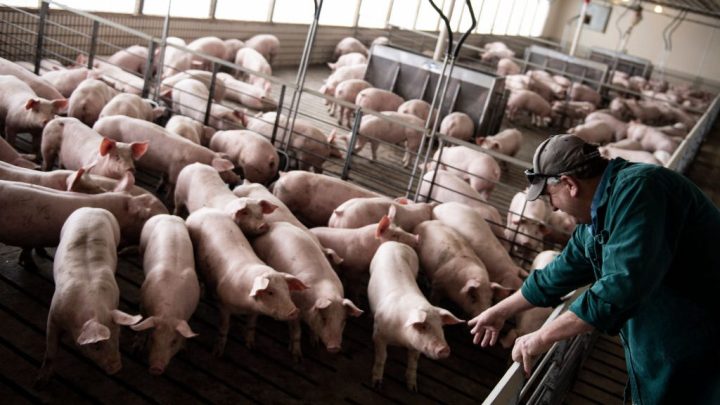
For farmers, it’s not just today’s inflation that matters. It’s next year’s too.
For farmers, it’s not just today’s inflation that matters. It’s next year’s too.

For farmer Brian Duncan, the farming itself is going well, but the business side of things is a different story — especially because of inflation. “Fuel, fertilizer, all of these things,” Duncan said. “We’ve seen a tremendous rise in prices.”
The key question for farmers like Duncan, who raises hogs and grows corn and soybeans: Are costs in balance with the price of what he sells? “Farmers are price takers,” he said. “We can’t just pass cost increases on to those who buy our products.”
But for now, Duncan said, it’s manageable because hog prices have been on the rise, but that could always change. “As we look at the prices that we are paying, especially on the fuel and fertilizer, we’re wondering, what happens when the prices we are taking for our goods go down? Where will fuel be priced at that time?”
The following is an edited transcript of Duncan’s interview with “Marketplace” host Kai Ryssdal. To listen, use the media player above.
Kai Ryssdal: Well, it’s been a year-plus. How are things?
Brian Duncan: Well, on the farm right now in Illinois, we’re feeling pretty good about our crops, at least. We’ve had some rain in most areas, and so feeling pretty positive about that. Like a lot of other businesses, the business side of things are challenging, to say the least.
Ryssdal: Say more about that. So let’s tick through them. No. 1: inflation. Is that a factor for you?
Duncan: Oh, absolutely. Fuel, fertilizer, all of these things, we’ve seen a tremendous rise in prices. And the availability of parts and of machinery — you know, in some case, things that we need are not available at any price, like some machinery repairs and things that we needed this spring. So yeah, challenging times. Definitely.
Ryssdal: So what do you do if you can’t get them, parts for the tractor or grain for the hogs? What do you do?
Duncan: Well, we wait at times. We wait on the supply chain or we improvise. Farmers are making do with less. We’re being more strategic about where we use our inputs. And we’re wondering about what this next crop year brings as we start planning for 2023. Already, we’re trying to get prices, trying to budget. But, Kai, remember, farmers are price takers. And that puts us in a really tough spot. We just can’t pass cost increases on to those that buy our products, and so there’s a lot of pencil scratching going on right now. How’s that sound?
Ryssdal: Well, it’s funny because I’ve got an apple farmer I talk to up in, up in Yakima, Washington, and we had him on the other day. And he said literally the same thing, that you guys are price takers. And that never kind of occurred to me that you don’t have the luxury at the foundational level of agriculture to say, “No, my hog costs $42 a pound” or “My corn costs, you know, $17 a bushel.” You’ve got to take what the market gives you.
Duncan: That’s absolutely right. And at the end of the day, we hope our production is good enough and the price is good enough to cover our costs and give us and our family some money to live on. And, you know, we’ve been pretty fortunate this year. Our commodity prices have gone up. But as we look at the prices that we are paying, especially on the fuel end, and fertilizer — those costs have gone up two to three times what they were a year ago. And so we’re wondering, what happens when the prices we are taking for our goods go down? Where will fuel be priced at that time?
Ryssdal: Well, let me put your own question back to you. What will happen when that happens, Mr. Duncan?
Duncan: It will get tight. Overall, there are decisions that will be made at the farm level that could impact production capabilities, if you do with less fertilizer or less crop inputs overall. We will try to be as creative and as resourceful as we can.
Ryssdal: Can I ask you — it’s kind of a personal question, I suppose. But we’ve been talking a while, so I figure I can get away with it.
Duncan: We’re friends, right?
Ryssdal: That’s right. Why do you do this? Why are you a farmer?
Duncan: Oh, I love it. It’s a calling, I really believe, Kai. And there’s nothing else I’d rather do. And it’s challenging, right? There’s no businesses that [are] without challenge. So we have some opportunities right now. Prices are good. The challenge we have is how to keep costs in line, [so] that the prices we are receiving can cover the cost. And my dad always said, “Son, if this was easy, everybody would do it.”
Ryssdal: Are you, are you running the family farm? Was it your dad’s farm?
Duncan: Yes, I’m running the farm, and now I have children actually farming with me, adult children. There are several families that are making a living off this farm, and Kai, there’s, there’s no better place to raise a family and no better place to live. And so challenges and opportunities — we try to make the most of the opportunities and lessen the impact of the challenges.
There’s a lot happening in the world. Through it all, Marketplace is here for you.
You rely on Marketplace to break down the world’s events and tell you how it affects you in a fact-based, approachable way. We rely on your financial support to keep making that possible.
Your donation today powers the independent journalism that you rely on. For just $5/month, you can help sustain Marketplace so we can keep reporting on the things that matter to you.











